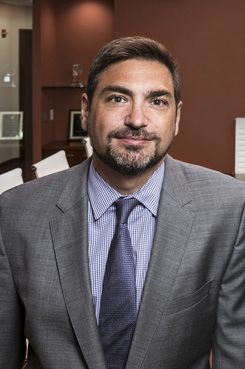Everybody's Found Something to Hate in Proposed Changes to Deposition Rules
Defense firms and companies claim that the requirement to meet and confer over the identity of corporate representives for 30(b)(6) depositions.
February 14, 2019 at 05:35 PM
5 minute read
The original version of this story was published on National Law Journal
 John Beisner of Skadden, Arps, Slate, Meagher & Flom. Photo: Diego M. Radzinschi/ALM
John Beisner of Skadden, Arps, Slate, Meagher & Flom. Photo: Diego M. Radzinschi/ALM
Proposed changes to the way depositions of corporate representatives are handled under the Federal Rules of Civil Procedure have tweaked both sides of the bar, it seems.
The Judicial Conference Advisory Committee on Civil Rules is considering the first major amendment to Federal Rule of Civil Procedure 30(b)(6) since it was adopted in 1970. The amended rule as currently proposed would require parties to meet and confer “about the number and description of the matters for examination and the identity of each person the organization will designate to testify.”
According to written testimony and correspondence with the committee, plaintiffs lawyers largely back the move to change Rule 30(b)(6) to require parties to meet and confer about the identity of each person who will testify on behalf of a corporation as a whole, although they object to the call to limit the number of topics that can be covered.
What follows is a snapshot of some of the comments from Big Law firms and plaintiffs attorneys that have been submitted written testimony prior to the committee's hearing Feb. 8.
>> Hagens Berman Sobol Shapiro partner Lauren Barnes, who represents plaintiffs in pharmaceutical marketing and antitrust litigation, wrote that “arbitrary, one-size-fits-all limitations on the number of topics” could lead to more discovery fights ending up in court in the complex cases she handles against pharmaceutical companies. “What is appropriate in the cases I pursue may make no sense for many other cases. In our practice, lawyers operating as zealous advocates for their clients but in good faith work within the Rule as currently drafted and are able to sharpen their pencils and agree on the appropriate treatment and interpretation of deposition notices and topics, seeking the court's guidance only when truly necessary,” she wrote. “That is how it should remain.”
>>Mark Chalos, managing partner of Lieff Cabraser Heimann & Bernstein's office in Nashville, Tennessee, wrote that disclosing the identity of witnesses in advance of depositions “promotes efficiency and is consistent with the letter and spirit of the Federal Rules of Civil Procedure,” but that limiting topic covered “is unnecessary, would potentially lead to inefficiencies, and would be unfair.” Wrote Chalos: “The explicit statement in the Committee Note that the parties have an ongoing obligation to meet and confer, but which process must be completed within a reasonable time, promotes efficient resolution of disputes.”
>>Writing on behalf of the U.S. Chamber Institute for Legal Reform last summer, Skadden, Arps, Slate, Meagher & Flom's John Beisner contended the proposed change would unnecessarily burden large companies to identify the most suitable corporate representative shortly after a subpoena is served, but before companies have done the necessary legwork. “Upending this orderly process and forcing corporations to provide the names of corporate representatives early in the 30(b)(6) process would generate a Hobson's choice for these parties,” Beisner wrote. “Either they could spend exorbitant amounts of money (on top of the substantial sums already associated with civil discovery) in an attempt to expedite the process for selecting the best suited corporate representative at the outset or they could simply come up with the name of a representative off the cuff.”
>> Michael Nelson and Thomas Byrne of Eversheds Sutherland claim the proposed rule significantly expands the obligations on organizations. “Would the proposal lead to less squabbling over the procedures? Almost certainly not; there will now be another layer of potential disputes, with no substantive guidance provided by the rule,” they wrote. “Greater efficiency? Not so; it will only prolong the proceedings under the rule and add to the process-cost of litigation.”
>> Venable's Bruce Parker, who defends products liability cases for pharmaceutical and medical device makers, said that compelling companies to potentially hand over a list of possible corporate deponents early in the meet and confer process could lead them to hand potentially privileged material as the list narrows. “It is functionally equivalent to asking requesting counsel to identify the names of all of the experts considered but not retained for any purpose,” Parker wrote. “Such a discovery inquiry would be rejected as invading the opinion work product of the requesting counsel.”
 Hassan Zavareei of Tycko & Zavareei.
Hassan Zavareei of Tycko & Zavareei.>> Hassan Zavareei of plaintiffs firm Tycko & Zavareei, who started his career at Gibson, Dunn & Crutcher, wrote that requiring parties to discuss the number of deposition topics in advance “will invite unnecessary gamesmanship.” Zavareei wrote: “A list of ten topics can be easily manipulated into five broader topics, or fifteen more specific topics, for instance.”
>> LeClairRyan's Thomas Regan, the partner in charge of the firm's New Jersey and Philadelphia offices, and the leader of the firm's products liability and transportation team, points out that the meet-and-confer requirement runs counter to language in the rule and case law indicating the company ultimately chooses. “Counsel is required under the amendment to meet and confer in good faith,” Regan wrote. “Given the statements in the current and proposed rule and the Committee Note that the choice of witness remains exclusively with defense counsel, it calls into question what conduct would qualify as bad faith, so long as the witness identified is the witness produced, even over the most vociferous of objections from the noticing party.”
>> Sharon Caffrey of Duane Morris called the proposed amendment “an invitation for aggressive lawyers to try to block corporate designees they predict will be articulate and strong witnesses, in hopes of causing a less effective witness to act as designee.” Writes Caffrey: “I have already experienced lawyers attempting just that tactic under the existing rule. It will become even more abused under the Proposed Amendment's vague requirement to 'confer.'”
This content has been archived. It is available through our partners, LexisNexis® and Bloomberg Law.
To view this content, please continue to their sites.
Not a Lexis Subscriber?
Subscribe Now
Not a Bloomberg Law Subscriber?
Subscribe Now
NOT FOR REPRINT
© 2025 ALM Global, LLC, All Rights Reserved. Request academic re-use from www.copyright.com. All other uses, submit a request to [email protected]. For more information visit Asset & Logo Licensing.
You Might Like
View All
Trying a Case for Abu Ghraib Detainees Two Decades After Abuse

Why Lewis Roca's Doug Tumminello Treks to Ukraine to Offer Material and Moral Support in Fight Against Russia

Litigators of the Week: In Largest MDL to Date, 3M Settles for $6B With Veterans Claiming Hearing Damage

Litigators of the Week: Willkie's $455M Win Against Iran for US Soldiers Hurt or Killed in Terrorism Attacks in Iraq
Trending Stories
Who Got The Work
J. Brugh Lower of Gibbons has entered an appearance for industrial equipment supplier Devco Corporation in a pending trademark infringement lawsuit. The suit, accusing the defendant of selling knock-off Graco products, was filed Dec. 18 in New Jersey District Court by Rivkin Radler on behalf of Graco Inc. and Graco Minnesota. The case, assigned to U.S. District Judge Zahid N. Quraishi, is 3:24-cv-11294, Graco Inc. et al v. Devco Corporation.
Who Got The Work
Rebecca Maller-Stein and Kent A. Yalowitz of Arnold & Porter Kaye Scholer have entered their appearances for Hanaco Venture Capital and its executives, Lior Prosor and David Frankel, in a pending securities lawsuit. The action, filed on Dec. 24 in New York Southern District Court by Zell, Aron & Co. on behalf of Goldeneye Advisors, accuses the defendants of negligently and fraudulently managing the plaintiff's $1 million investment. The case, assigned to U.S. District Judge Vernon S. Broderick, is 1:24-cv-09918, Goldeneye Advisors, LLC v. Hanaco Venture Capital, Ltd. et al.
Who Got The Work
Attorneys from A&O Shearman has stepped in as defense counsel for Toronto-Dominion Bank and other defendants in a pending securities class action. The suit, filed Dec. 11 in New York Southern District Court by Bleichmar Fonti & Auld, accuses the defendants of concealing the bank's 'pervasive' deficiencies in regards to its compliance with the Bank Secrecy Act and the quality of its anti-money laundering controls. The case, assigned to U.S. District Judge Arun Subramanian, is 1:24-cv-09445, Gonzalez v. The Toronto-Dominion Bank et al.
Who Got The Work
Crown Castle International, a Pennsylvania company providing shared communications infrastructure, has turned to Luke D. Wolf of Gordon Rees Scully Mansukhani to fend off a pending breach-of-contract lawsuit. The court action, filed Nov. 25 in Michigan Eastern District Court by Hooper Hathaway PC on behalf of The Town Residences LLC, accuses Crown Castle of failing to transfer approximately $30,000 in utility payments from T-Mobile in breach of a roof-top lease and assignment agreement. The case, assigned to U.S. District Judge Susan K. Declercq, is 2:24-cv-13131, The Town Residences LLC v. T-Mobile US, Inc. et al.
Who Got The Work
Wilfred P. Coronato and Daniel M. Schwartz of McCarter & English have stepped in as defense counsel to Electrolux Home Products Inc. in a pending product liability lawsuit. The court action, filed Nov. 26 in New York Eastern District Court by Poulos Lopiccolo PC and Nagel Rice LLP on behalf of David Stern, alleges that the defendant's refrigerators’ drawers and shelving repeatedly break and fall apart within months after purchase. The case, assigned to U.S. District Judge Joan M. Azrack, is 2:24-cv-08204, Stern v. Electrolux Home Products, Inc.
Featured Firms
Law Offices of Gary Martin Hays & Associates, P.C.
(470) 294-1674
Law Offices of Mark E. Salomone
(857) 444-6468
Smith & Hassler
(713) 739-1250






